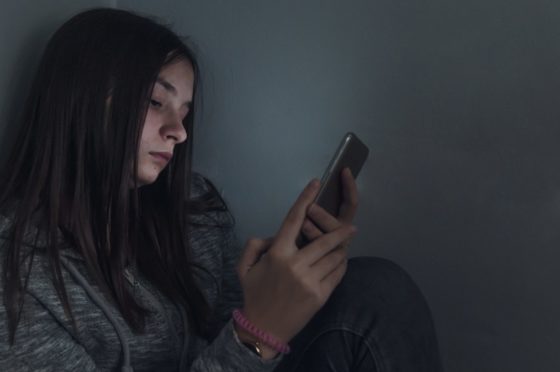Childline is helping parents spot the signs of bullying as new figures reveal hundreds of children are seeking support for school and online incidents.
More than 334 Scottish pupils received counselling sessions from the leading children’s charity in 2020/21 – and more than a quarter of these were about online bullying.
One teenage girl who contacted the charity about bullying said she had to sit next to her tormentor in school every day.
The 14-year-old said: “School was not great today. Due to the coronavirus there are new rules and I have to sit next to the most horrible boy ever in almost every class.
“He tells me to do stuff, calls me names, spreads rumours and tells me I should hurt myself.
“I am so fed up with it and I can’t get away from him.”
And you can help us investigate how bullying is tackled in schools by taking part in our survey.
Signs of bullying in person
As anti-bullying week begins this week, Childline has provided a few common signs to look out for if you suspect your child is being bullied at school or in the community.
As well as being afraid to go to school, other signs include:
- Belongings are getting lost or damaged
- Physical injuries such as unexplained bruises
- Not doing as well at school
- Being nervous, losing confidence, or becoming distressed and withdrawn
- Problems with eat or sleeping
- Bullying others
Signs of bullying online
There are also common signs that a child or young person is being bullied on social media or online.
- Not wanting to go to school or take part in normal activities
- Getting anxious or angry if you go near their device
- Feeling withdrawn, upset or angry at home
- Problems eating or sleeping
- Having angry outbursts that seem out of character
- Spending more or less time online than normal
Has bullying changed over time?
Bullying has remained a concern for pupils in Scotland despite a fall in the number of bullying-related counselling services.
In 2019/20, Childline delivered 558 sessions around in-person and online bullying however the charity has said cyber bullying concerns have remained high.
Why the change in counselling numbers?
Adeniyi Alade, head of Childline in Scotland, said: “Each year we hear from hundreds of children in Scotland who are being bullied.”
She added: “Children experiencing bullying online have told our counsellors that during lockdowns it felt even more overwhelming.
“The extra time they were spending online for their education, entertainment and to keep in contact with friends and family was making the bullying feel inescapable.
“Although for other children, the lockdowns provided some respite from the bullying they had previously experienced. But this meant that they felt anxious at the thought of returning to school.”
